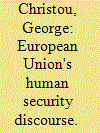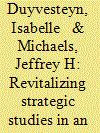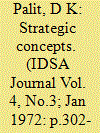| Srl | Item |
| 1 |
ID:
131636


|
|
|
|
|
| Publication |
2014.
|
| Summary/Abstract |
The language of human security has been prominent in the European Union's (EU) official discourse for a number of years. However, whilst it has been promoted as a new approach for the EU in the development of its security and defence policy, the aim of this article is to assess the extent to which it actually features in the EU's contemporary strategic discourse and practice. It seeks to uncover where and how the concept is spoken within the EU's institutional milieu, how it is understood by the relevant policy-makers in the EU and the implication of this across key areas of human security practice. It is argued in the article that human security has not been embedded as the driving strategic concept for Common Security and Defence Policy (CSDP) in an era of crisis and change in Europe and beyond and that the prospects for this materialising in the near future are rather thin.
|
|
|
|
|
|
|
|
|
|
|
|
|
|
|
|
| 2 |
ID:
151032


|
|
|
|
|
| Summary/Abstract |
The paper discusses the essence, changing content, and new objectives of military strategy, as well as its role and place in military art in the first half of the 21st century.
|
|
|
|
|
|
|
|
|
|
|
|
|
|
|
|
| 3 |
ID:
148072


|
|
|
|
|
| Summary/Abstract |
Amidst recent Western military campaigns that have defied strategic logic and produced few, if any, tangible gains, the utility of force in contemporary conflicts is being questioned increasingly, yet very few useful answers are emerging. Unfortunately, policymakers have too limited an understanding of military affairs, and the officials and experts tasked to inform them often have vested interests or lack imagination. Whereas strategic studies scholars were once highly sought after to “think the unthinkable” and provide fresh ideas for policymakers, the field has since fallen on hard times and shows no signs of recovery. To resuscitate the field there is an urgent need for a fundamental re-evaluation of long-standing strategic concepts in light of present realities.
|
|
|
|
|
|
|
|
|
|
|
|
|
|
|
|
| 4 |
ID:
184363


|
|
|
| 5 |
ID:
138607


|
|
|
|
|
| Summary/Abstract |
In a piece published in the June–July issue of Survival, I considered ‘Ukraine and the Art of Crisis Management’.1 My aim was to explore the relevance of the strategic concepts of the Cold War to the unfolding drama of Ukraine, and in particular the challenge of securing essential interests without triggering a wider war. I judged the crisis to have been badly managed by Russia, not particularly well by the West, and with great difficulty by Ukraine. The consequences of the failure of crisis management lay not so much in expanding the area of conflict but instead in a sharp deterioration in relations between Russia and the West, and continuing and unsettling violence within Ukraine. The result was that, over subsequent months, the role of Russian forces within Ukraine became more direct and overt, as the more irregular separatist forces were unable to cope.
|
|
|
|
|
|
|
|
|
|
|
|
|
|
|
|